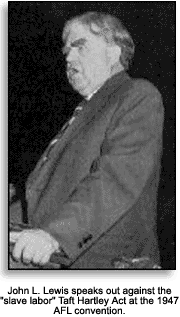Taft-Hartley Act of 1947
The Taft-Hartley Act of 1947, sponsored by U.S. Senator Robert A. Taft and Representative Fred A. Hartley, was designed to amend much of the National Labor Relations Act of 1935 (the Wagner Act) and discontinued parts of the Federal Anti-Injunction Act of 1932.
 The Taft-Hartley Act was the first major revision to the Wagner Act, and after much resistance from labor leaders and a veto from President Harry S. Truman, was passed on June 23, 1947.
The Taft-Hartley Act provides for the following:
The Taft-Hartley Act was the first major revision to the Wagner Act, and after much resistance from labor leaders and a veto from President Harry S. Truman, was passed on June 23, 1947.
The Taft-Hartley Act provides for the following:
It allows the president to appoint a board of inquiry to investigate union disputes when he believes a strike would endanger national health or safety, and obtain an 80-day injunction to stop the continuation of a strike.
It declares all closed shops illegal.
It permits union shops only after a majority of the employees vote for them.
It forbids jurisdictional strikes and secondary boycotts.
It ends the check-off system whereby the employer collects union dues.
It forbids unions from contributing to political campaigns.
The act also required union leaders to take an oath stating that they were not communists. Although many people tried to repeal the act, the Taft-Hartley Act stayed in effect until 1959 when the Landrum-Griffin Act amended some of its features.
 The Taft-Hartley Act was the first major revision to the Wagner Act, and after much resistance from labor leaders and a veto from President Harry S. Truman, was passed on June 23, 1947.
The Taft-Hartley Act provides for the following:
The Taft-Hartley Act was the first major revision to the Wagner Act, and after much resistance from labor leaders and a veto from President Harry S. Truman, was passed on June 23, 1947.
The Taft-Hartley Act provides for the following: